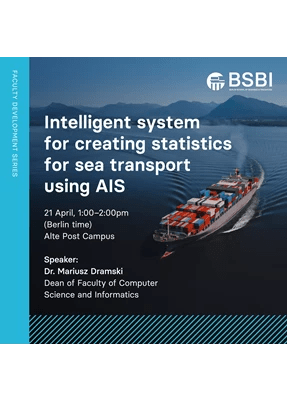April 21, 2023
Guest Speaker: Dr Mariusz Dramski
Auditorium: 402/405
An intelligent system for creating statistics for sea transport using AIS
Sea transport is an essential part of global trade, connecting nations and facilitating the movement of goods and people across the world. Accurate statistics on sea transport are vital for informed decision-making and planning in the industry. However, collecting and analysing this data can be a complex and time-consuming process.
One approach to overcome these challenges is to use an intelligent system that can generate statistics automatically. Automatic Identification System (AIS) is one such system that can provide real-time information on vessel movements, including location, speed, and direction. AIS is mandatory for all large vessels and is used to improve maritime safety and avoid collisions at sea.
The intelligent system we propose leverages AIS data to create statistics on sea transport automatically. The system uses machine learning algorithms to analyse AIS data and identify patterns in vessel movements, such as routes, ports of call, and vessel types. These patterns are then used to generate statistics on sea transport, including the number of vessels in a given area, the most frequent routes taken by vessels, and the busiest ports.
One of the advantages of using an intelligent system based on AIS is its ability to generate real-time statistics. As AIS data is updated every few seconds, the system can provide up-to-date information on vessel movements, which is particularly useful for tracking vessels during emergencies, such as natural disasters or search and rescue operations.
Another benefit of the proposed system is its ability to automate the data collection and analysis process, reducing the time and resources needed to generate statistics. This frees up resources to focus on more strategic and high-level tasks, such as policy development and planning.
However, there are some limitations to the system. For example, AIS data is limited to vessels over a certain size, and smaller vessels may not be included. Additionally, the system relies on accurate and up-to-date AIS data, which may not always be available.
In conclusion, an intelligent system based on AIS data can provide valuable insights into sea transport and help support informed decision-making and planning in the industry. With the increasing importance of sea transport in global trade, the use of intelligent systems to generate statistics will become essential.











